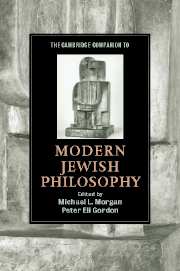Book contents
- Frontmatter
- 1 Introduction: Modern Jewish Philosophy, Modern Philosophy, and Modern Judaism
- 2 Baruch Spinoza and the Naturalization of Judaism
- 3 The Liberalism of Moses Mendelssohn
- 4 Jewish Philosophy after Kant The Legacy of Salomon Maimon
- 5 Hermann Cohen: Judaism and Critical Idealism
- 6 Self, Other, Text, God: The Dialogical Thought of Martin Buber
- 7 Franz Rosenzweig and the Philosophy of Jewish Existence
- 8 Leo Strauss and Modern Jewish Thought
- 9 Messianism and Modern Jewish Philosophy
- 10 Ethics, Authority, and Autonomy
- 11 Joseph Soloveitchik and Halakhic Man
- 12 Emmanuel Levinas: Judaism and the Primacy of the Ethical
- 13 Emil Fackenheim, the Holocaust, and Philosophy
- 14 Evil, Suffering, and the Holocaust
- 15 Revelation, Language, and Commentary: From Buber to Derrida
- 16 Feminism and Modern Jewish Philosophy
- Bibliography
- Index
6 - Self, Other, Text, God: The Dialogical Thought of Martin Buber
Published online by Cambridge University Press: 28 September 2007
- Frontmatter
- 1 Introduction: Modern Jewish Philosophy, Modern Philosophy, and Modern Judaism
- 2 Baruch Spinoza and the Naturalization of Judaism
- 3 The Liberalism of Moses Mendelssohn
- 4 Jewish Philosophy after Kant The Legacy of Salomon Maimon
- 5 Hermann Cohen: Judaism and Critical Idealism
- 6 Self, Other, Text, God: The Dialogical Thought of Martin Buber
- 7 Franz Rosenzweig and the Philosophy of Jewish Existence
- 8 Leo Strauss and Modern Jewish Thought
- 9 Messianism and Modern Jewish Philosophy
- 10 Ethics, Authority, and Autonomy
- 11 Joseph Soloveitchik and Halakhic Man
- 12 Emmanuel Levinas: Judaism and the Primacy of the Ethical
- 13 Emil Fackenheim, the Holocaust, and Philosophy
- 14 Evil, Suffering, and the Holocaust
- 15 Revelation, Language, and Commentary: From Buber to Derrida
- 16 Feminism and Modern Jewish Philosophy
- Bibliography
- Index
Summary
What is Martin Buber’s legacy to Jewish thought? Buber was certainly one of the most prolific and influential Jewish thinkers of the twentieth century. His writings covered a vast array of disciplines, including several areas of philosophy, mystical traditions from around the world and Hasidism, as well as biblical scholarship, hermeneutics and translation. Above all, he was a visionary thinker, who sought to overcome the ’sickness of the age' by engaging in authentic relationships with others and teaching his students and readers to do the same.
In assessing Buber’s legacy to Jewish thought, I will outline the parallels between the development of his approach to hermeneutics and his changing view of the ideal way of relating to others, particularly other human beings and God. I will look in some detail at I and Thou, Buber’s masterpiece of dialogical philosophy, and explore the extent to which his mature philosophy of dialogue is challenged by the Shoah.
EARLY WRITINGS
Buber was born in 1878 in Vienna. Following the separation of his parents when he was three years old, he was raised until the age of fourteen by his paternal grandparents in Galicia. As a child growing up on his grandfather’s estate in Poland, Buber participated in a traditionally observant Jewish life and was also exposed to the Hasidic way of life of some of his Jewish neighbours in Poland. Buber’s grandfather, Solomon, was a prominent scholar in the Haskalah – Jewish enlightenment movement – whose critical editions of Midrash are still highly regarded.
- Type
- Chapter
- Information
- The Cambridge Companion to Modern Jewish Philosophy , pp. 102 - 121Publisher: Cambridge University PressPrint publication year: 2007
- 4
- Cited by



